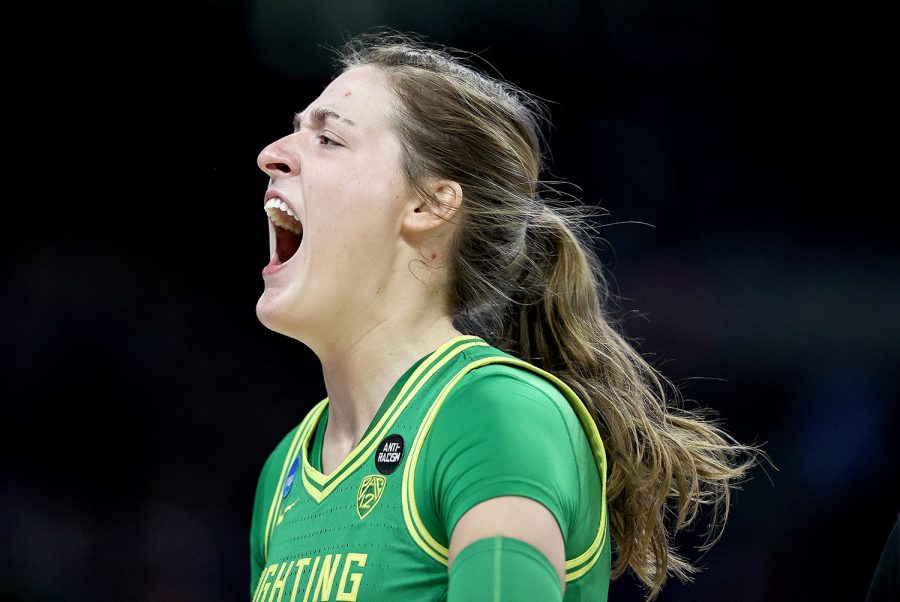Opinion | Prioritize gender equity in collegiate athletics
After the appalling display of gender discrimination in the 2021 basketball championships, the NCAA must reevaluate their policies to prioritize gender equity.
Sedona Prince (32) of the Oregon Ducks screams before the start of the game against the Louisville Cardinals during the Sweet Sixteen round of the NCAA Women’s Basketball Tournament at the Alamodome on March 28, 2021 in San Antonio, Texas. (Elsa/Getty Images/TNS)
April 11, 2021
The NCAA finally crowned the winners of the 2021 men’s and women’s basketball championships, but this year I can’t dwell on the results of the tournaments. Many fans watched their team’s journey without taking notice of the disparate treatment between the men’s and women’s teams. But we can no longer ignore it. It’s time to talk about the complicit nature of the NCAA regarding gender disparities in collegiate athletics.
If you missed the viral TikTok by University of Oregon’s Sedona Prince or the photos comparing men’s and women’s amenities, allow me to outline it for you. The men’s weight room is spacious, boasting multiple weight racks, benches, and sets of dumbbells. In Texas, the women’s “weight room” is one bench with sanitized yoga mats and a set of dumbbells.
The NCAA also gave bags of merchandise to players that participate in the men’s or women’s tournament. Comparing the bags it’s clear more money went to the men’s gift bags. The NCAA gifted male players shoes, towels, ample toiletries, and extra various items in comparison to the women.
When it comes to the food served by the NCAA, the men enjoyed family-style potluck dinners that look significantly more appealing than the individually packaged meals the women athletes received. The photos side by side highlight the blatant manner in which the NCAA provided separate and unequal accommodations for male and female athletes.
Even COVID-19 testing protocol wasn’t standard between both tournaments. The University of Connecticut women’s basketball coach Geno Auriemma confirmed that his team used antigen tests, while their male counterparts had PCR tests. According to the Food and Drug Administration, antigen tests are more likely to miss an infection while PCR tests are considered to be highly accurate.
Although the NCAA is not subject to Title IX provisions, it fails to meet its own standards of conduct. As outlined in section 2.3.3 of the NCAA’s Division 1 manual, “the activities of the Association should be conducted in a manner free of gender bias.” It’s unacceptable that the public had to hold the NCAA accountable to their own policies.
The NCAA apologized for the weight room debacle and chalked it up to poor internal communication, but those of us who follow women’s sports know a cheap excuse when we hear one. This oversight occurred because of a complete lack of effort by the NCAA to support the women’s basketball tournament.
Recently revealed financial records show that the NCAA regularly spends millions more on the men’s tournament than the women’s. It’s true that the men’s tournament generates more revenue compared to the women’s tournament, and some say that justifies the unequal allocation. That men’s sports generate more money isn’t a fact of life, but rather the root of the problem.
In response to the negative backlash after the tournament, the NCAA hired a law firm to independently evaluate their policies, specifically regarding the allocation of resources and funding. Upon completion of the reports, the governing body of collegiate athletics will have an opportunity to enact top-down systemic change in women’s sports.
If the NCAA allocates more funding and places a greater emphasis on promoting the women’s tournament, positive consequences will come as a result.
It is truly shameful that even the governing body of collegiate athletics is reinforcing unequal treatment instead of being a leader on the forefront of gender equity issues. Especially after the blatant disparity in tournament facilities this March, I implore NCAA officials to learn from their mistakes and make gender equity in collegiate athletics a priority.
Columns reflect the opinions of the authors and are not necessarily those of the Editorial Board, The Daily Iowan, or other organizations in which the author may be involved.














